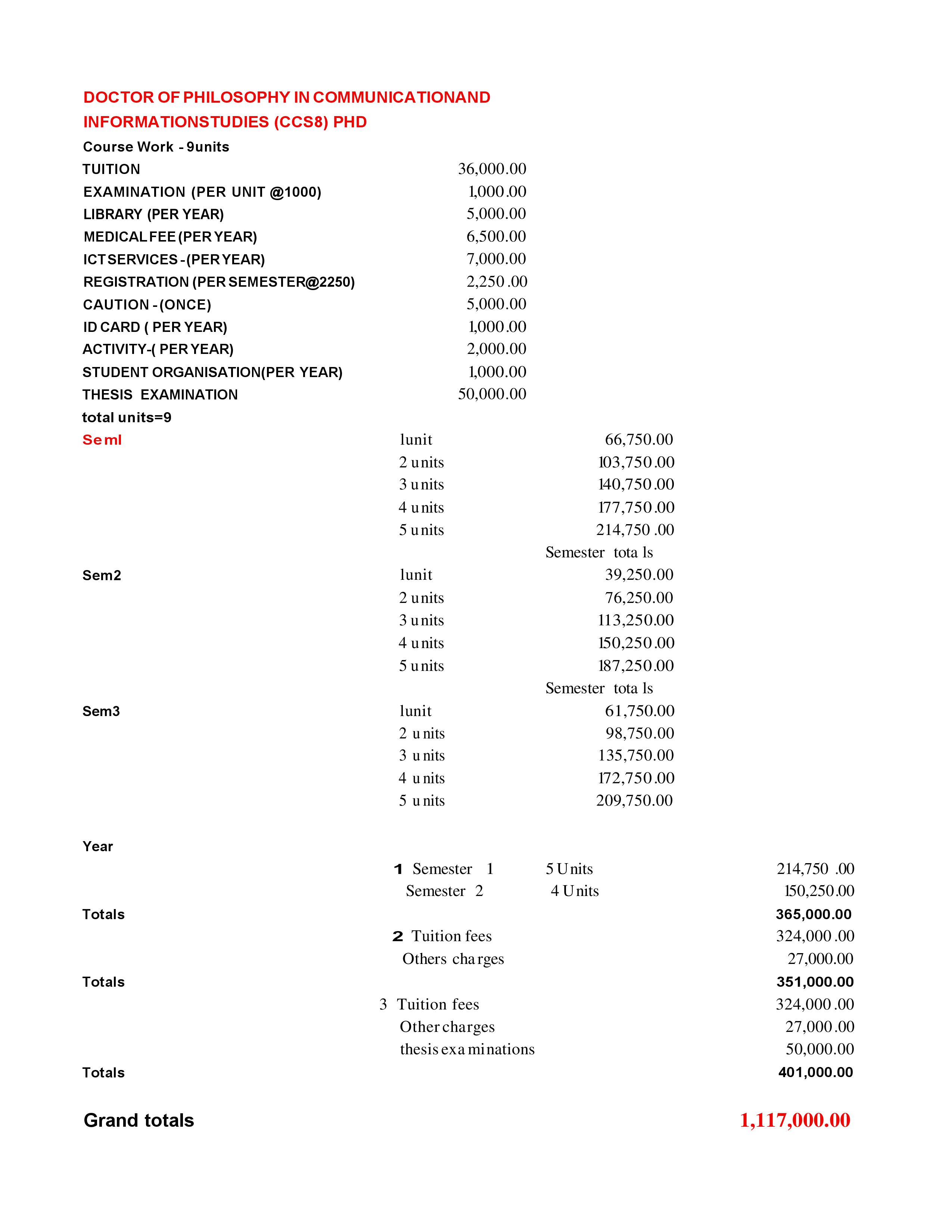Overview
Rationale
This programme provides a chance to train a high calibre of professionals in the discipline of
communications and information studies. It aims to produce well-grounded scholars with
competencies in teaching and research.
Development of this programme was informed by a market survey of the media and
communications industry that revealed a dire need of competent and well-skilled communication
professionals. Some of these areas that are in urgent need of highly skilled and competent
communication professionals include teaching, research, management and various forms of
consultancy. Additionally, this curriculum was informed by input from key industry stakeholders
who participated at a workshop.
This programme is intended to provide students who wish to undertake doctoral studies in
communications with an opportunity to delve into the theoretical and practical depths of
communication and information studies.
The programme is informed by the dynamic changes and complexities in the communications
landscape, coupled with market trends and industry needs. It is also structured to instil requisite
communication skills necessary for the realisation of Vision 2030 and the Sustainable
Development Goals.
Many governments and organisations in the region have expressed the need to develop staff locally
rather than pursue much more expensive programmes in America, Europe and elsewhere.
Philosophy
This programme is anchored on, and informed by, the vision and mission of the University of
Nairobi. The programme seeks to provide quality education in media and communications training
in order to produce qualified and competent graduates who are able to engage in sustainable global
development.
Objectives
The general aim of this programme is to offer knowledge and competencies that are critical to the
understanding and practice of communication and information as a discipline.
The specific aims are to:
1. Develop academic competences in Communication and Information Studies;
2. Equip the student with critical scholarship skills in communication and information;
3. Equip the student with advanced research knowledge and competencies in research in
humanities and social sciences;
4. Provide critical academic grounding in theoretical, philosophical and practical
understanding in communication and information;
5. Explore the effects of communications and information on society.
Contact of Support Persons
Chairman,
Department of Journalism and Mass Communication,
Faculty of Arts and Social Sciences,
University of Nairobi
P.O. Box 30197-00100,
NAIROBI
Main Campus,
Education Building,
3rd Floor, Room 302,
Tel: +254 020 4913208
Cell: +254 757 115431
Email: soj@uonbi.ac.ke
Structure
Schedule of intakes
Once in a year (September)
Mode of Delivery
The mode of delivery of this programme will be through:
- Face-to-face lectures
- Open and Distance and E-learning (ODeL)
- Blended learning mode
PHD IN INFORMATION AND COMMUNICATION STUDIES COURSE STRUCTURE
|
Semester |
Course Unit |
Course Title
|
|
|
Semester One |
CCS8101 |
Theories of Communication and Information
|
|
|
CCS8102 |
Communication, Media and Information Management
|
|
|
|
CCS8103 |
Research Methods in Communication and Information
|
|
|
|
CCS8104 |
Policies and Regulations in Communication and Information
|
|
|
|
CCS8105 |
Trends in Communication and Information Technologies
|
|
|
|
Semester Two |
|
||
|
CCS8106 |
Organizational Communication and Behavior (Core Course)
|
|
|
|
Choose Three Electives
|
|
||
|
CCS8107 |
Communication and Culture
|
|
|
|
CCS8108 |
Public Relations Theory and Practice
|
|
|
|
CCS8109 |
Development Communication Theory and Practice
|
|
|
|
CCS8110 |
Journalism and Media Studies
|
|
|
|
Semester Three |
|
|
|
|
CCS8220 |
Thesis (Equivalent To 8 Units)
|
|
|
Admission Requirements
Admission Requirements
The common regulations for admission into the PhD programme in the University of Nairobi shall apply.
In addition, applicants must be holders of a Master’s degree in communication or information studies or any other relevant discipline from the University of Nairobi or any other institution recognised by University of Nairobi Senate.
Credit Transfer and Exemptions
- The common regulations for credit transfer and exemptions of the University of Nairobi shall apply.
- A student may be exempted from taking some of the course units and may be allowed to transfer credit to a maximum for one third (1/3) of all the taught course units if they had been taken at an equivalent level of education from institutions recognised by the University of Nairobi Senate. They will however be expected to pay all the prescribed non-refundable fees.
- A student seeking credit transfer or exemption shall send a formal application to the Director, Graduate School, University of Nairobi, through the Director, School of Journalism and Mass Communication, justifying the request.
- Grades for transferred course units shall be entered in the student’s transcripts while the exempted course units shall be entered in the transcript as ‘Exempt.’
Careers
Attachment Opportunities
- Not applicable
Careers In Journalism and Communication Studies
Upon graduation with Doctor of Philosophy in Communication and Information Studies degree, a graduand may pursue the following career opportunities:
* News Organizations
* Non Governmental Organizations
* Corporate Communications
Fees and Funding

